
We sometimes hear from people that they are worried coal may be a necessary evil to keep us warm this winter. But the worst effects of this energy crisis was, and to some extent is, avoidable. Low-hanging fruit include home insulation, community-owned renewable energy generation, and an effective windfall tax on profiteering energy companies. These measures can be rapidly deployed, and we’ve seen from Covid what the Government can achieve big changes when there is political will to. Coal is not, and for the sake of our future, cannot be, the answer to how keep warm this winter. That is why half the demands of the Warm This Winter campaign centre around renewable energy and excluding fossil fuels as the way we will access affordable energy this winter and in future years.
The Warm This Winter campaign’s 3rd demand is access to cheaper energy—“Clean, renewable energy is now nine times cheaper than gas and can be brought online quickly”. Subsidy-free solar, in particular, has been demonstrated as cheaper than its fossil fuel alternatives. Prices have fallen dramatically for renewable energy since introduction – whereas fossil fuels continue to rely on huge Government subsidies, infrastructure, and underwriting of risk.
The 4th demand of the Warm This Winter campaign is to cut out fossil fuels as “it keeps us locked into an unaffordable energy for far longer than necessary”. The UK Government sells our natural resources to companies that extract it and sell it back to us at unaffordable prices to generate huge profits for themselves—never more so than in 2022.

The energy crisis has created a swing in vocal public support for coal mining since the energy crisis, and with it, political support for coal mine applications has grown in the highest echelons of Government. The Government has sent mixed signals recently on whether it will approve or reject the Whitehaven coal mine application, which has now been delayed by a further month to before the 9th December 2022.
It is particularly clear that the Government is using the energy crisis as an excuse to abandon its climate commitments wholesale since it’s citing the energy crisis for renewing its support for coal mine applications… that have nothing to do with power generation. All the current coal mine applications are to mine coal for industry—not power generation.
The Government will hand over £420 million in tax money to profiteering energy companies to keep old coal power stations, like West Burton, and coal units, like Drax, chugging along this winter. These power stations and units were scheduled for closure in 2022, but now these dirty, dusty relics will be stoked with thousands of tonnes of imported coal, paid for with our taxes. In fact this move is expected to generate so much pollution that the Government has instructed the Environment Agency to ignore its responsibility to enforce pollution limits when it comes to coal fired energy production this winter. People living locally to these power stations will pay the price in potentially dangerously poor air quality, but we will all pay the price in our taxes and in our future compromised by the climate change a reliance on coal fuels.

Rolling out home insulation tackles the energy crisis and bills not just this year, but for many years to come—and the impact is immediate. It would also help the Government get back on track with its climate commitments as housing is responsible for 19% of the UK’s carbon emissions. This should be a top priority for Government in tackling the cost-of-living crisis and energy crisis together this winter.
In 2012, the UK insulated 2.3 million loft or cavity walls. But a shift in Government policy saw uptake drop by 90%. This Government decision to cut support for home insulation after 2012 has cost taxpayers, like me and you, £1 billion in energy bills this year. If the Government had maintained the same level of support, nearly 50% of UK homes could have been insulated by now. A more recent scheme by the UK Government collapsed, and was blasted by the Audit Office for being “botched”. This would have significantly reduced the energy crisis this winter, along with our bills. Households living in homes with poor efficiency ratings will pay around £1000 more this winter.
The British public overwhelmingly support the rollout of renewables, with 78% supporting solar power, 75% offshore wind, and 70% onshore wind. Unlike non-renewable sources of power like nuclear power stations, renewable energy infrastructure can be rapidly scaled up and brought online. With clear public support, the Government could rapidly accelerate renewable energy roll-out that isn’t vulnerable to shifts in geopolitics and global supply chains.
Because renewable energy is modular—one wind turbine or one solar panel can be bought and set up, or 1000s—its more affordable for communities buy their own equipment and become power generators, with the profits returning to those communities rather than disappearing into the pockets of big business. The Government acknowledges the value of community-owned renewable energy, but isn’t doing enough to encourage it. Instead, the Government dropped the Social Investment Tax Relief for community energy and has failed to provide the financial guarantees it provides to other energy projects like nuclear power stations. If the UK faced this winter with a resilient network of renewable energy zones, our dependence on gas and fossil fuels would have been much lower, and energy prices would be more insulated from Russian sanctions, geopolitics, and global demand and supply shifts.
The Government imposed a windfall tax in May 2022 as a one-off tax on the record profits made by energy companies that are due to lifted Covid restrictions and supply concerns around Russia’s invasion of Ukraine. However, BBC reported: “BP reported its biggest quarterly profit for 14 years, making £6.9bn in the three months to June. Shell recorded even higher second quarter profits of £9bn and made £8.2bn in the following three months. The majority of the April to June takings won't be hit by the government's windfall tax, as it only applies from 26 May”. The Guardian reported “Shell has paid zero windfall tax in the UK despite making record global profits of nearly $30bn (£26bn) so far this year”. Yet the Government has resisted pressure to tax these record profits and redistribute to cushion energy prices, so less of the UK have to choose between food and heating this winter.

This information seeks to clarify which tips are included in ERI Ltd’s proposal to mine and then flatten certain coal tips in Caerphilly. The tips selected appear to be on the basis of which would be most profitable to mine of the ‘waste coal’ they contain…
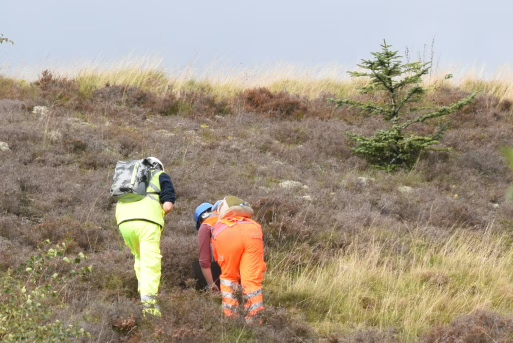
The Welsh Government’s Deputy First Minister, in his response to the CCEIC’s Stage 1 Report, admits the “Bill does not prevent the extraction or burning of coal” but adds “I cannot envisage a scenario in which the extraction and burning of coal will arise as a result of the Bill”…
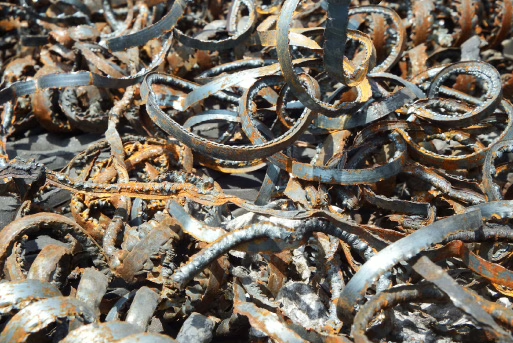
The direct use of coal as a feedstock (not just energy) is particularly significant in China, where coal is used extensively in coal to gasification plants to produce chemicals such as methanol, ammonia, and…

This nature was photographed around 50 metres from the edge of the Glan Lash opencast coal mine in Ammanford, South Wales. It shows the thriving ecosystems surrounding the Glan Lash opencast coal mine which has remained dormant since 2019…
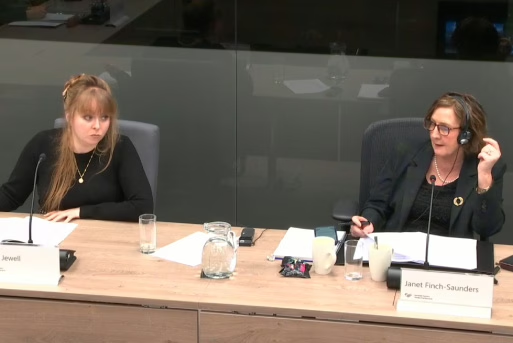
In February, CAN gave oral testimony to the Climate Change, Energy, and Infrastructure Committee (CCEIC) on the Disused Mine and Quarry Tips (Wales) Bill…
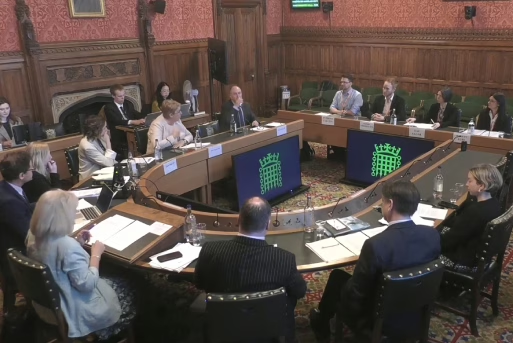
Coal Action Network was invited to attend Westminster where we gave evidence to the Welsh Affairs Committee in their inquiry about the environmental and economic legacy of Wales’ industrial past, alongside Friends of the Earth Cymru. This inquiry was opened in…
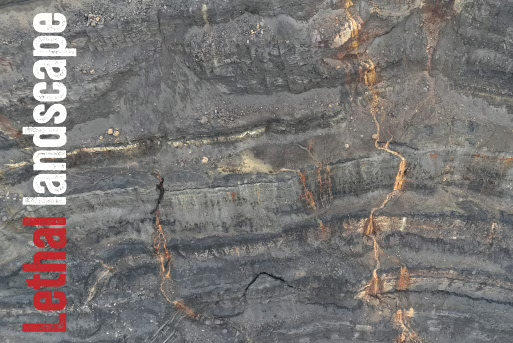
16 years of opencast coal mining in Ffos-y-fran has generated colossal overburden mounds, also known as slag heaps or coal tips. There are three coal tips, with the third being the largest, and cumulatively accounting for 37 million cubic metres of colliery spoil, rocks, and soil…
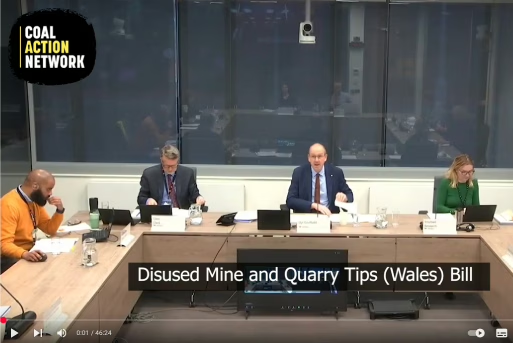
We were invited for the second time to give oral evidence to the Climate Change, Environment, and Infrastructure Committee of the Welsh Parliament (Senedd) on 05th February 2025. We shared the panel with Haf, Director of FOE Cymru, to provide our opinion on the weaknesses, strengths…

Merthyr (South Wales) Ltd mined for over a year illegally after planning permission for the Ffos-y-fran opencast coal mine ended in September 2022. During that year, it made record-breaking profits due to sanctions on Russia and other factors driving up the price of coal. But rather than using some of the profits from that ill-gotten coal…
Previous governments could have/should have, ensured that most buildings in the UK have solar panels on the roof, and have invested in all the other renewable forms of energy so that by now, we could have been energy independent, without the need for the use of any fossil fuels. But of course we know that governments are corrupt, and refuse to do the right thing.
Lack of political commitment to tackle climate change is obvious, the amount of subsidies to fossil fuel and dodgy bio fuel projects shows that big business still controls decisions.